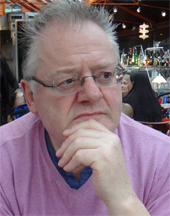

theoretical underpinnings of research
researching online communities
theoretical & empirical fields
investigating research MA module
Conceptualising and Designing Research
updated 19th May 2025
|
|||
| site search by freefind |
I am a sociologist. My field of interest includes the sociology of pedagogy and pedagogic relations, texts, strategies, sites, technologies and institutions, media and cultural studies, mathematics education and information and communications technology. In recent years I have taken a particular interest in methodology.
The Sociology of Mathematics Education: Mathematical Myths/Pedagogic Texts (London, Falmer Press) introduced my general methodological approach ('constructive description') and my language for the analysis of pedagogic texts (now referred to as 'social activity method', SAM). Both have far wider potential fields of application than school mathematics and you don't have to be a mathematician or a mathematics teacher to read the book. Sociology as Method: departures from the forensics of culture, text and knowledge is now available from Sense Publishers (but cheaper at Amazon). This work extends the language considerably and also extends the range of applications, from film, to art, to classrooms, and so on.
The work also includes a fundamental engagement with the work of Basil Bernstein; here's the preface (don't let it put you off):
I’m inside a dark cave, but I’m looking out into the light, not at shadows on the back wall. An elderly woman shambles out of the bathhouse. “Domo arigatou”, she drawls as she hands bottles of body wash and shampoo to the attendant hiding in the kiosk. She moves to her shoes that have been waiting for her, glancing back at me. She thinks about a greeting, thinks better of it and shambles out. A young couple hurry in. Bolder, the girl bows and the boy mutters, “Konnichiwa.’ And they hurry up the stairs to their room. A sporty team of boys step shyly inside the door. They enquire at the kiosk, take their bottles and shuffle into the bathhouse. Not much later, dampened, they shuffle out again, asking the way to the station (how did they get here, I wonder).
Two boys and a dog, a woman with an umbrella (it’s quite sunny out), a man with a briefcase and a traffic of cars and vans and scooters glide past without so much as a glance. A middle-aged woman appears to say ‘tombo’—dragonfly—on her way out of the bathhouse; perhaps I’ve missed a syllable or two or, more likely, adjusted a couple of consonants. Then a young American man, wearing shorts, stands in the doorway, looking at me, and asks,
“What kind of place is this?”
“It’s an onsen.”
“Excuse me?”
“It’s a hot spring bathhouse and hotel. You pay at the kiosk.”
“Cool”, he says and wanders off.
-
But it’s not cool at all. In fact it’s very, very hot—too hot—and very public. Which is why I’m sitting in the lobby and waiting for my friends and not in the bath.
Are you interested in all this? I guess the answer might depend on where it’s going. Well, it’s not going anywhere, right now.
- The second edition of Doing Research/Reading Research—jointly authored with Andrew Brown—is available from Amazon.
-
Old newspaper photo of my teenage band (I'm the one in the middle)
Not to mention my multiple roles in a famous Hollywood movie
***
What is Education: what is research?
Theory and Methodology in Qualitative Social Research (Staff Workshops)
Theory and Methodology in Research (pre-2023) (doctoral seminar)
2020. Authority and Ethics: A case for estrangement in educational research and research education. British Educational Research Journal. DOI: 10: 1002/berj.3639 (with Natasha Whiteman)
Mathematics Education: Is it ethical
Qualitative Approaches and Methods in Social Research (public presentation at Toyo Eiwa University, Tokyo, 12th December 2015)
Archive site from the doctoral school course, Conceptualising and Designing Research
Fermented Shark! paper
paper available via Springer Open Access: Social Activity Method (SAM): A fractal language for mathematics.
Investigating Research MA Module site (updated to include the Spring 2016 run).
Papers and Presentations at Madif7 and Matematikbiennalen, Stockholm, January 2010
Biography
After graduating in physics from Imperial College, London, I taught mathematics in secondary schools for fifteen years. During this time I completed a Diploma in Education and an MA in the sociology of education. My doctoral thesis in the sociology of education was supervised by Basil Bernstein. I joined the Institute of Education as a lecturer in 1987, originally in the Department of Mathematics , Statistics & Computing. I joined CCS when it formed in 1995 and this group joined with two others to form CLC in january 2002. A number of re-organisations followed and I am currently a member of the Department of Culture Communication and Media. I have taught on Institute courses in Hong Kong, Brazil and Beijing and have taught, as a visitor, in a number of universities in South Africa. For the last 20 years or so I have lived in Japan for 4-5 months (not all at once) each year.
***
home/who&where/current interests/publications/research students/students' work/
r&d in ict in education/theoretical underpinnings of research/text analysis seminar 2004/
literacy, communication & ict/interrogating texts/a timely utterance/
researching online communities/upgrading&monitoring progress/theory in research
theoretical & empirical fields/an introduction to research/SAM/investigating research MA module/
Conceptualising and Designing Research
